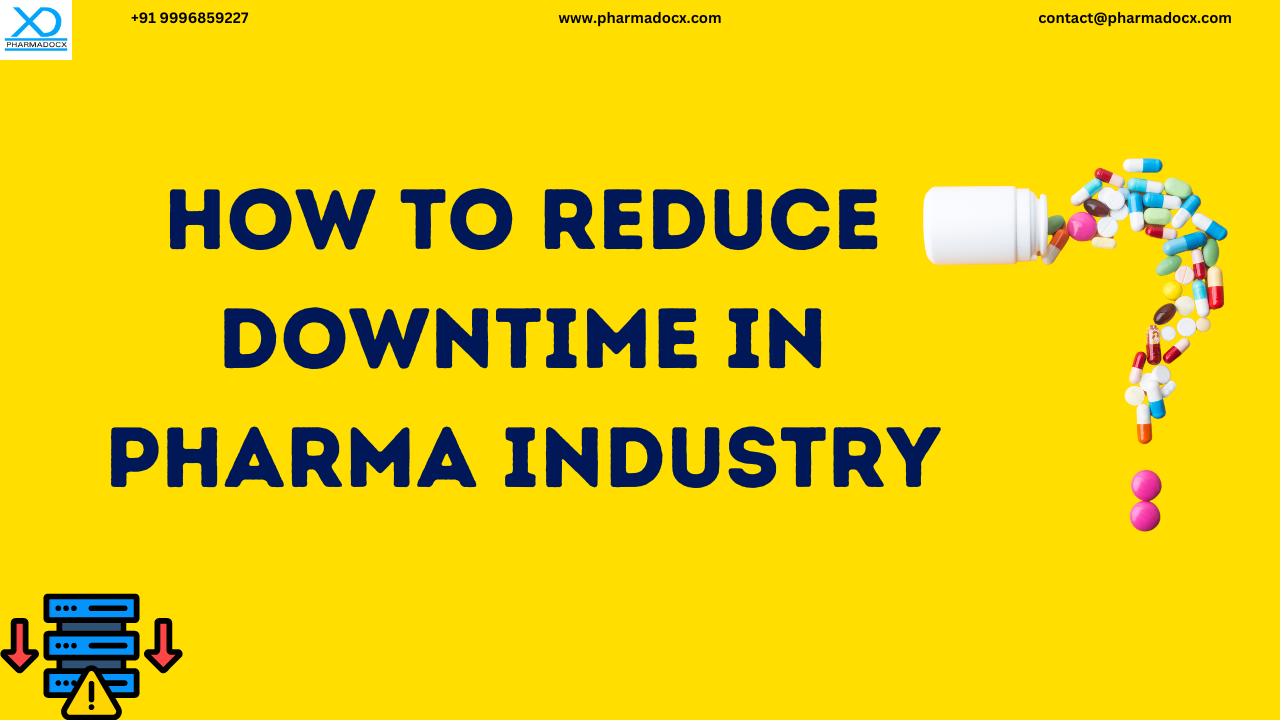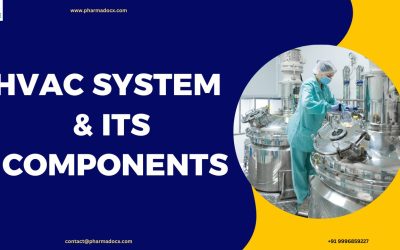In this blog, we have discussed why pharma companies should pay special attention to downtime, especially unplanned downtime.Additionally, we have provided some tips for reducing downtime in pharma industry.
What is downtime?
To reduce downtime in pharma industry, it is important to understand what is downtime. Downtime is basically any period during which the production process is not running or the production is halted. Downtime can occur due to a variety of reasons. Two types of downtime usually occur: planned and unplanned downtimes.
- Planned downtime: Planned downtime is usually scheduled and organized. It allows for the operators and operations to prepare for the downtime. Planned downtime is required for machine maintenance, inspections, and cleaning. Operators can coordinate with contractors and plan other tasks to complete while the operation and production process is down. This downtime is preplanned in a manner operators can complete all urgent and ongoing tasks.
- Unplanned downtime: Unplanned downtime occurs when machine or operational process is unexpectedly down. This type of downtime is unscheduled. Unplanned downtime can occur due to malfunction of machinery, breakdown of parts, lack of material, power outage, etc. This type of downtime is unpredictable. Companies should aim to specifically reduce unplanned downtime.
Reducing downtime increases productivity of the manufacturing facility and improves operational efficiency. It lowers costs and decreases chances of accidents. Notably, understanding the reason for the “downtime” is the key to reducing it.
Challenges associated with downtime in pharma industry
Downtime in any industry is associated with revenue loss and may even impact brand reputation. However, downtime in pharma industry is a big challenge for the healthcare sector. The health and wellbeing of individuals depend on the proper functioning of the pharma industry. The pharma industry is required to consistently manufacture high quality medicine for the protection of public health. Hence, any downtime in pharma industry will disrupt the supply of pharmaceutical products.
Furthermore, unplanned downtime in pharma industry is an even bigger challenge for both pharma and healthcare sectors. Under maintenance leads to unplanned downtime. It unexpectedly disrupts the supply of pharmaceutical products, such as vaccines, antibiotics, and other prescription drugs. Moreover, it is important to note sudden unplanned downtime can affect the regulated temperature and humidity being maintained in the pharmaceutical production environment. Preset temperature and humidity have to be maintained while manufacturing pharmaceuticals. Thus, unplanned downtime in pharma industry can negatively impact the safety, efficacy, and sterility of the pharmaceuticals in the production line. Therefore, unplanned downtime in pharma industry will not only disrupt the supply chain but also lead to contamination of pharmaceuticals.
Hence, pharma companies should strive to reduce maintenance emergencies and unplanned downtime as much as possible. Additionally, during planned downtimes, the temperature and humidity of the production environment should be maintained at requisite levels. Planned downtimes should be scheduled in a manner the safety, efficacy, and sterility of the pharmaceuticals are not affected. Pharma companies should focus on predictive maintenance by actively monitoring the performance and condition of equipment and machinery during normal operation. The data collected should be analysed to predict and prevent equipment failure through corrective maintenance.
Importance of reducing unplanned downtime in pharma industry
In the pharma industry, unplanned downtime is significantly more dangerous and costly than planned downtime. As unplanned downtime is unpredictable and operations could be down for numerous reasons, it is not possible to be prepared for this situation. Hence, unplanned downtime has a serious impact on the pharma sector that has a ripple effect on the healthcare sector. Thus, pharma companies should strive to reduce downtime by actively monitoring the performance and condition of equipment and machinery.
Furthermore, unplanned downtime can lead to near-misses or accidents in the manufacturing facility. During unplanned downtime, technical personnel have to aim to get the machine up and running again as soon as possible. If no proper trouble shooting strategy is in place, unplanned downtime can leave technical personnel scrambling. This can lead to a chaotic environment resulting in near-misses or accidents in the manufacturing facility.
Downtime in pharma industry adds to production costs. Longer downtime impacts production efficiency and time that would directly lead to decreased manufacturing of pharmaceuticals. Additionally, waiting for broken parts and necessary personnel would further increase the downtime adding to losses. Furthermore, unsellable pharmaceutical products manufactured and material wasted during downtime further adds to the costs. Additionally, products manufactured right at the onset of the downtime and right after the machines are up and running again have compromised quality. Hence, these pharmaceutical products are unsellable and wasted.
Downtime reduces pharmaceutical manufacturing process efficiencies and production potential. Therefore, pharma companies have to strive to reduce unplanned downtime to reduce waste that can help lower overall operational costs. Additionally, it will reduce chances of mishaps and accidents that occur when employees are put in unpredictable situations. Hence, pharma companies should aim for continuous improvement of their manufacturing process and operations.
How to reduce downtime in pharma industry?
1) Constantly monitor the production process and machinery
During normal operation, the performance and condition of equipment and machinery should be constantly monitored to collect data on performance trends. A robust system should be in place to monitor production and track process trends. This will give an idea of how the process is running and if variables are changing or staying consistent. Then, the data collected should be analysed to predict and prevent equipment failure via corrective maintenance. Furthermore, alarms can be fitted to warn operators when production conditions are getting disrupted. This can allow the operators to respond quickly, thereby prevent a downtime.
2) Regularly schedule preventive maintenance
Preventative maintenance is carried out during planned downtime or while the manufacturing process is running. Moreover, regular maintenance, such as adding or changing lubricating oils, and cleaning will increase the lifetime of the machinery. Additionally, replacement of parts during planned downtime will ensure orders for the parts can be placed on time. Furthermore, necessary maintenance personnel will also be available onsite to perform maintenance tasks. This will help save money and time. Furthermore, preventive maintenance data should be recorded and analysed. It can be used to predict downtime and drive necessary maintenance.
3) Operator decision support and troubleshooting strategy
Unplanned downtime is inevitable. Hence, a proper troubleshooting strategy should be in place. The aim should be to reduce the duration of downtime. Operators should be provided with necessary tools and troubleshooting guides to support them during the downtime. Additionally, they should be provided with the necessary resources to help them find the root cause of the downtime.
4) Track downtime and collect data
The downtime period should be carefully monitored to collect data. The data will provide insights into the reason for the downtime that will be helpful to prevent future unplanned downtimes. The following information should be recorded: duration, product being manufactured prior to the downtime, crew involved, process area, and environmental condition. This information will be vital to understand the root cause. Furthermore, nowadays, companies are using software for tracking downtime in pharma industry. The software can automatically capture downtime events and record data. Also, it can even be used to analyse the data collected.
5) Incorporating continuous improvement in quality management system
Incorporating continuous improvement in the quality management system will help reduce downtime. Additionally, use the Plan-Do-Check-Act (PDCA) strategy to use an iterative approach for reducing downtime. Thus, implementing robust process that continuously analyse the production process and ensure regulatory compliance will go a long way in reducing downtime.
Reducing downtime in pharma industry is vital for improving productivity
Downtime, especially unplanned downtime, will hamper productivity in a pharmaceutical manufacturing company. Constantly monitoring the production process and tracking the downtime period are vital. Furthermore, smooth operation of the pharma sector is vital for the smooth operation of the healthcare industry. Thus, companies should strive to reduce downtime in pharma industry. Developing pharmaceutical manufacturing processes per regulatory guidelines will ensure high-quality products are consistently manufactured as well reduce chances of downtime. We at Pharmadocx Consultants are committed to make your pharmaceutical company regulatory compliant. Drop an email at [email protected] or call/Whatsapp on 9996859227 and our team will simplify your regulatory journey.





